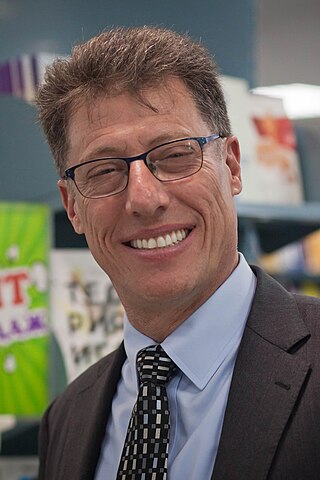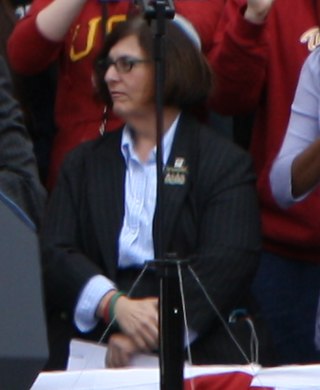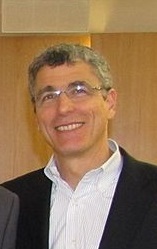Related Research Articles

Conservative Judaism is a Jewish religious movement that regards the authority of Jewish law and tradition as emanating primarily from the assent of the people through the generations, more than from divine revelation. It therefore views Jewish law, or halakha, as both binding and subject to historical development. The conservative rabbinate employs modern historical-critical research, rather than only traditional methods and sources, and lends great weight to its constituency, when determining its stance on matters of practice. The movement considers its approach as the authentic and most appropriate continuation of halakhic discourse, maintaining both fealty to received forms and flexibility in their interpretation. It also eschews strict theological definitions, lacking a consensus in matters of faith and allowing great pluralism.

Judaism is an Abrahamic, monotheistic, and ethnic religion. It comprises the collective spiritual, cultural, and legal traditions of the Jewish people, having originated as an organized religion in the Middle East during the Bronze Age. Contemporary Judaism evolved from Yahwism, the cultic religious movement of ancient Israel and Judah, around the 6th/5th century BCE, and is thus considered to be one of the oldest monotheistic religions. Religious Jews regard Judaism as their means of observing the Mosaic covenant, which was established between God and the Israelites, their ancestors. Jewish religious doctrine encompasses a wide body of texts, practices, theological positions, and forms of organization.

The Jewish Theological Seminary (JTS) is a Conservative Jewish education organization in New York City, New York. It is one of the academic and spiritual centers of Conservative Judaism and a center for academic scholarship in Jewish studies. The Jewish Theological Seminary Library is one of the most significant collections of Judaica in the world.
Religious pluralism is a set of religious world views that hold that one's religion is not the sole and exclusive source of truth, and thus recognizes that some level of truth and value exists in other religions. As such, religious pluralism goes beyond religious tolerance, which is the condition of peaceful existence between adherents of different religions or religious denominations.

Jewish ethics is the ethics of the Jewish religion or the Jewish people. A type of normative ethics, Jewish ethics may involve issues in Jewish law as well as non-legal issues, and may involve the convergence of Judaism and the Western philosophical tradition of ethics.
Jewish religious movements, sometimes called "denominations", include diverse groups within Judaism which have developed among Jews from ancient times. Today in the west, the most prominent divisions are between traditionalist Orthodox movements and modernist movements such as Reform Judaism originating in late 18th century Europe, Conservative originating in 19th century Europe, and smaller others.

Tzedakah is a Hebrew word meaning "righteousness", but commonly used to signify charity. This concept of "charity" differs from the modern Western understanding of "charity". The latter is typically understood as a spontaneous act of goodwill and a marker of generosity; tzedakah is an ethical obligation.
Tikkun olam is a concept in Judaism, which refers to various forms of action intended to repair and improve the world.

The Israel Movement for Reform and Progressive Judaism is the organizational branch of Progressive Judaism in Israel, and a member organization of the World Union for Progressive Judaism. It currently has 40 communities and congregations around the state of Israel, 13 of which are new congregations – referred to as U'faratztah communities – and two kibbutzim, Yahel and Lotan.
Jewish feminism is a movement that seeks to make the religious, legal, and social status of Jewish women equal to that of Jewish men in Judaism. Feminist movements, with varying approaches and successes, have opened up within all major branches of the Jewish religion.
Eric H. Yoffie is a Reform rabbi, and President Emeritus of the Union for Reform Judaism (URJ), the congregational arm of the Reform movement in North America, which represents an estimated 1.5 million Reform Jews in more than 900 synagogues across the United States and Canada. He was the unchallenged head of American Judaism's largest denomination from 1996 to 2012. Following his retirement in 2012, he has been a lecturer and writer; his writings appear regularly in The Huffington Post, The Jerusalem Post, and Haaretz.

Daniel Gordis is an American-born Israeli author and speaker, who is best known as a passionate advocate of Israel. He is Koret Distinguished Fellow at Shalem College in Jerusalem, where he previously also served as Senior Vice President and Chair of the Core Curriculum, until his retirement from those positions. The author of a dozen books on Judaism and Israel, and twice awarded the National Jewish Book Award, The Forward has called Gordis "one of the most influential Israel analysts around." Gordis is also the author of the blog and podcast, Israel from the Inside, which is published on Substack.

Denise Leese Eger is an American Reform rabbi. In March 2015, she became president of the Central Conference of American Rabbis, the largest and oldest rabbinical organization in North America; she was the first openly gay person to hold that position.
The relationship between Judaism and politics is a historically complex subject, and has evolved over time concurrently with both changes within Jewish society and religious practice, and changes in the general society of places where Jewish people live. In particular, Jewish political thought can be split into four major eras: Biblical, Rabbinic, Medieval, and Modern.
Sharon Kleinbaum is an American rabbi who serves as spiritual leader of New York City's Congregation Beit Simchat Torah. She has been an active campaigner for human rights and civil marriage for gay couples.
Over the course of Jewish history, different attitudes have been held towards poverty and wealth. Unlike Christianity, in which some strands have viewed poverty as virtuous and desirable, Jews have generally viewed poverty negatively. Jacobs and Greer assert, "In general, Jewish texts have portrayed poverty as an unjustifiable burden". In contrast to the consistently negative view of poverty, Kravitz and Olitzky describe a rapidly changing attitude towards acceptance of wealth as desirable as the Hebrews transitioned from being nomadic shepherds to farmers, then ultimately to city dwellers.

Richard Jacobs is a Reform rabbi and the president of the Union for Reform Judaism (URJ), the congregational arm of the Reform movement in North America which represents an estimated 1.5 million Reform Jews in nearly 900 synagogues across the United States and Canada. He is the first Union president to have served most of his career as a congregational rabbi. Before being installed as URJ president in June 2012, he served for nine years at Brooklyn Heights Synagogue and then for twenty years at Westchester Reform Temple in Scarsdale, New York.

Shmuly Yanklowitz is an Orthodox rabbi. In March 2012 and March 2013, Newsweek and The Daily Beast listed Yanklowitz as one of the 50 most influential rabbis in America.

T'ruah: The Rabbinic Call for Human Rights, often referred to as T'ruah, is a left-wing nonprofit organization of rabbis who act on the Jewish imperative to respect and protect the human rights of all people in North America, Israel, and the Palestinian Territories. Approximately 2,000 American and Canadian rabbis and cantors, very predominantly non-orthodox in denomination, are affiliated with T'ruah. T'ruah was founded as Rabbis for Human Rights-North America (RHR-NA) in 2002. On January 15, 2013, RHR-NA ended its formal affiliation with Rabbis for Human Rights in Israel, and was renamed T'ruah. The name T’ruah is based on one of the sounds of the shofar acting as a call to take action.
This is a timeline of LGBT Jewish history, which consists of events at the intersection of Judaism and queer people.
References
- ↑ "T'ruah: The Rabbinic Call for Human Rights".
- ↑ Nussbaum Cohen, Debra (April 6, 2011). "Rabbi Jill Jacobs Will Head Rabbis for Human Rights-North America". The Forward. Retrieved 21 March 2021.
- ↑ Jacobs, Jill (2009). There Shall Be No Needy: Pursuing Social Justice through Jewish Law and Tradition. Jewish Lights Publishing. ISBN 9781580233941.
- ↑ Rabbi Jill Jacobs (May 28, 2008). "Work, workers, and the Jewish owner" (PDF). The Rabbinical Assembly. Retrieved March 31, 2011.
- ↑ "The 50 Most Influential Rabbis in America". Newsweek. June 28, 2010. Retrieved April 1, 2011.
- ↑ "Forward 50, 2006". The Forward. 2006. Retrieved April 1, 2011.
- 1 2 "Forward 50, 2008". The Forward. 2008. Archived from the original on June 1, 2020. Retrieved April 1, 2011.
- ↑ "Jill Jacobs - Forward 50". 2011.
- ↑ "36 Under 36: The Next Wave SOCIAL JUSTICE & GLOBAL CHANGE". The Jewish Week. May 21, 2008. Archived from the original on June 15, 2011. Retrieved April 1, 2011.
- ↑ "50 Influential Rabbis". April 3, 2009.
- ↑ "The 50 Most Influential Rabbis in America". June 28, 2010. Archived from the original on September 30, 2013. Retrieved January 16, 2013.
- ↑ "America's 50 Most Influential Rabbis". April 16, 2011.
- ↑ "America's Top 50 Rabbis for 2012". 2012.
- ↑ Marder, Rachel (May 14, 2013). "Women to Watch". The Jerusalem Post. Retrieved 21 March 2021.
- ↑ Jill Jacobs (December 18, 2009). "Coming Up Short on the Tzedakah Yardstick". The Forward. Retrieved April 1, 2011.
- ↑ Jill Jacobs (April 14, 2009). "Tzedakah, Take Two". ZEEK. Retrieved April 1, 2011.
- ↑ Jacobs, Jill (December 12, 2019). "Trump still appears to believe all Jews are really Israelis". The Washington Post.
- ↑ Jacobs, Jill (February 8, 2019). "The false comfort of Trump's condemnation of anti-Semitism". The Washington Post. Retrieved 18 April 2021.
- ↑ Jacobs, Jill (January 11, 2019). "Your tax dollars are propping up the intellectual heirs to an Israeli terrorist". The Washington Post.
- ↑ "Rabbi Jill Jacobs, Randi Weingarten arrested at Garner protest". Jewish Telegraphic Agency. December 4, 2014. Retrieved 18 April 2021.
- ↑ "Bookshelf | Columbia College Today". www.college.columbia.edu. Retrieved 2022-05-25.
- ↑ "Jill Jacobs, Guy Austrian". The New York Times. August 5, 2007. Retrieved April 1, 2011.
- ↑ Rabbi Marcelo R. Bronstein (December 2009). ""Al tifrosh min hatzibur," (Don't distance yourself from the community) Avot 2:5" (PDF). Kol Hadash. B'nai Jeshurun. Retrieved April 1, 2011.
- ↑ Jacobs, Jill (2009). There Shall Be No Needy: Pursuing Social Justice Through Jewish Law & Tradition. Woodstock, Vermont: Jewish Lights Publishing. pp. 220–221. ISBN 978-1-58023-394-1.
- ↑ Jacobs, Jill; Sokatch, Daniel (November 21, 2016). "Why Jews have a special obligation to resist Trump". The Washington Post. Retrieved 18 April 2021.
- ↑ Dias, Elizabeth; Haberman, Maggie; Durston, Ellen Almer (December 12, 2019). "Trump's Order to Combat Anti-Semitism Divides Its Audience: American Jews". New York Times. Retrieved 18 April 2021.
- ↑ "'Very Fine People': An Oral History of Trump and the Jews". Haaretz. Retrieved 18 April 2021.
- ↑ Sippy, Zachariah (December 10, 2020). "15 American-Jewish Leaders on how to bridge the divide between Israel and the Diaspora". The Forward. Retrieved 25 April 2021.
- ↑ Ben Ami, Jeremy; Jacobs, Jill (January 15, 2020). "Americans shouldn't forfeit their freedom of speech so states can support Israel". NBC News. Retrieved 25 April 2021.
- ↑ Jacobs, Jill (May 18, 2018). "How to tell when criticism of Israel is actually anti-Semitism". The Washington Post. Retrieved 25 April 2021.
- ↑ Tara Bahrampour (March 9, 2003). "NEIGHBORHOOD REPORT: MORNINGSIDE HEIGHTS; A Rift at Jewish Theological Over an Article About Israel". The New York Times. Retrieved April 1, 2011.
- ↑ Daniel Treiman (March 28, 2003). "E-mail Spat Shines Light On Volatile Israel Debates After the Fire". The Forward. Retrieved April 1, 2011.
- ↑ "Danny Gordis". lukeford.net. Retrieved 31 March 2011.
